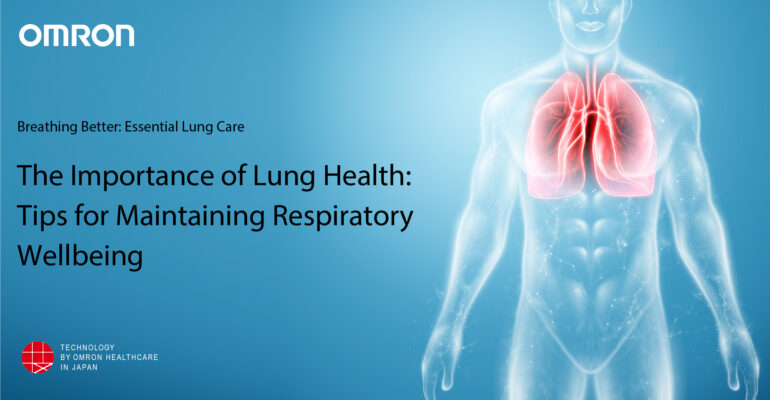The Importance of Lung Health: Tips for Maintaining Respiratory Wellness
March 5, 2023 2023-10-10 17:53The Importance of Lung Health: Tips for Maintaining Respiratory Wellness

The Importance of Lung Health: Tips for Maintaining Respiratory Wellness
Lung health is crucial for overall well-being and quality of life. According to the World Health Organization, respiratory diseases are responsible for one in seven deaths globally, and lung cancer is the deadliest of nearly all cancers, with 5-year survival rates of only 10% to 20%.[1]
The Importance of Knowing Your Risk:
Knowing your risk for lung disease is critical for taking proactive steps to prevent or manage potential health issues. Understanding your risk factors can help you make informed decisions about your lifestyle, and you can take steps to reduce your exposure to potential lung irritants and seek medical attention promptly if you experience any symptoms of lung disease.
The following are the most common types of lung disease:
- Asthma: A chronic condition in which the airways become inflamed, making it difficult to breathe. It is a long-term inflammatory disease of the airways of the lungs that affects children and adults. Asthma can be triggered by various factors, including allergens, exercise, and stress.
- Chronic Obstructive Pulmonary Disease (COPD): A group of lung diseases, including emphysema and chronic bronchitis, that make it difficult to breathe. COPD is usually caused by long-term exposure to irritating gases or particulate matter, such as cigarette smoke. [2]
- Lung Cancer: A type of cancer that starts in the cells of the lungs. It is often caused by smoking or exposure to other lung irritants. According to Chestnet Lung cancer is the deadliest of nearly all cancers, with 5-year survival rates of only 10% to 20%, even in developed countries.[3]
- Pulmonary Fibrosis: A condition in which the lung tissue becomes scarred, making it difficult to breathe. Pulmonary fibrosis can be caused by a variety of factors, including exposure to environmental toxins, autoimmune diseases, and certain medications.
- Pneumonia: An infection of the lungs that can be caused by bacteria, viruses, or fungi. It leads to inflammation in the air sacs of one or both lungs, called alveoli, which can fill with fluid or pus, making it difficult to breathe. Pneumonia can cause mild to severe illness in people of all ages and can be particularly dangerous for young children, older adults, and people with weakened immune systems.
- Tuberculosis (TB): A bacterial infection that primarily affects the lungs but can also affect other parts of the body. TB can cause cough, fever, night sweats, and weight loss.
Risk Factor of Lung Health:
- Smoking: Cigarette smoking is one of the most significant risk factors for lung disease, including lung cancer, COPD, and emphysema. Exposure to passive smoking can also increase the risk of lung disease.
- Air pollution: Exposure to environmental pollutants, such as vehicle exhaust, industrial emissions, and wildfire smoke, can increase the risk of respiratory illness.
- Occupational exposure: People who work in industries that involve exposure to dust, chemicals, and other airborne pollutants may be at increased risk of lung disease.
- Family history: Some lung diseases, such as lung cancer and pulmonary fibrosis, may be more common in families with a history of these conditions.
- Chronic respiratory conditions: People with pre-existing respiratory conditions, such as asthma or COPD, may be at increased risk of developing further lung disease.
- Genetics: Some genetic factors may increase the risk of lung disease, such as alpha-1 antitrypsin deficiency, which can cause emphysema. [4]
Lung Disease Prevention and Management Methods:
- Avoid smoking or exposure to passive smoking: Quitting smoking is the most effective way to prevent lung disease. Avoiding exposure to passive smoking can also help reduce the risk of respiratory illness.
- Protect yourself from air pollution: Try to limit exposure to environmental pollutants, such as vehicle exhaust and industrial emissions. Avoid exercising outdoors on days with poor air quality.
- Exercise regularly: Regular physical activity can improve lung function and help maintain overall good health.
- Maintain a healthy diet: Eating a healthy diet rich in fruits, vegetables, and whole grains can help support lung health.
- Get regular check-ups: Regular check-ups with your healthcare provider can help identify early signs of lung disease and provide appropriate treatment. [5]
OMRON Nebulizers can help manage Lung health. A nebulizer is a medical device that is used to deliver medication in the form of a mist that can be inhaled into the lungs. Nebulizers are commonly used to treat respiratory conditions such as asthma, COPD, and cystic fibrosis.[6]
Wrap Up:
Understanding the importance of lung health and taking proactive steps to maintain good lung health can help individuals live healthier, more active lives.
References:
- https://www.who.int/health-topics/chronic-respiratory-diseases#tab=tab_1
- https://www.webmd.com/lung/lung-diseases-overview
- https://journal.chestnet.org/article/S0012-3692(22)00049-6/fulltext
- https://www.cancer.org/cancer/lung-cancer/causes-risks-prevention/risk-factors.html
- https://www.healthline.com/health/understanding-idiopathic-pulmonary-fibrosis/ways-to-keep-your-lungs-healthy-and-whole#1.-Dont-smoke-or-stop-smoking
- https://www.omronbrandshop.com/nebulizers/






